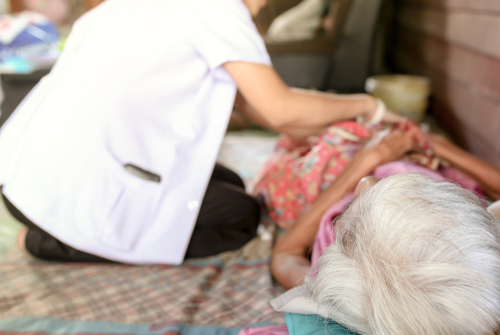More often than not, there’s a direct link between nursing home neglect and bedsores. What anyone who has a loved one in a nursing home needs to know is that, almost without exception, bed sores can be prevented through adequate care by nursing home care workers. Failure to meet the needs of residents at risk of developing bedsores amounts to nursing home neglect.
Bed sores, known technically as decubitus ulcers but also called pressure sores or pressure ulcers are ulcerations of the skin from—as the name denotes—unrelieved pressure against the skin. Pressure against a person’s bony prominences—such as shoulder blades, heels, elbows, sacrum, and hips—inhibits proper circulation, which causes skin to break down and ulcerate. Untreated bed sores can deteriorate, becoming serious and even deadly. While there are conditions and factors that may make a nursing home resident more susceptible to developing pressure ulcers, it is ultimately the sustained pressure of the body against an object (such as a bed or wheelchair) that causes a pressure sore to develop. Despite the tendency of nursing homes to claim that the development or deterioration of pressure sores is outside of their control, the fact remains that pressure ulcers are nearly always preventable.
It is important to know that nursing home neglect and bedsores are related, but can be avoided if handled correctly. It is the responsibility of the nursing home care provider to take certain measures toward preventing pressure ulcers. Should a patient develop a bed sore and these measures were not taken, nursing home neglect has taken place. Such measures include:
- Regularly monitoring residents who are at high risk for bed sores – A range of conditions affect a resident’s susceptibility to pressure sores, including
- Age
- Weight
- Mobility
- Incontinence
- Fragile skin that tears easily
- Dementia
- Diabetes
- Smokers
In addition to regularly turning or repositioning high-risk residents, care providers must also closely monitor their skin. Failure to do so equals neglect.
- Providing adequate care to avoid conditions that contribute to/exacerbate pressure ulcers – Care providers are responsible for giving sufficient care to residents, assuring basic hygiene, nutrition, and hydration needs are met. Bed sores are more likely under the following circumstances:
When nursing homes are owned by large for-profit corporations, these homes often reduce staffing in order to become profitable. Under these circumstances, overwhelmed care providers cannot provide the above adequate care to residents at high risk of pressure ulcer development. Short-staffing amounts to nursing home abuse and neglect.
- Providing basic pressure relief to bed- or wheelchair-bound residents – Nursing homes are required to regularly turn or reposition residents who are at risk of developing pressure sores. Such repositioning should take place at least every two hours. Beyond this fundamental means of alleviating the pressure that causes bed sores, care workers can provide such pressure-relieving apparatus as air mattresses and wheelchair cushions. Certain specialty beds also function to alleviate pressure. When pressure relief measures are required but not provided, it is an occurrence of nursing home neglect.
Because most nursing home residents have limited mobility, they are dependent upon nursing home staff to take every measure necessary to prevent pressure sores. Since it is extremely rare for a pressure ulcer to be deemed medically unpreventable, the appearance of pressure sores is a strong indication that nursing home neglect has occurred.
An Experienced Nursing Home Neglect Attorney
Despite their refusal to accept responsibility, it falls to nursing homes to provide proper care to prevent bed sores. Federal and state laws require Philadelphia / PA and NJ nursing homes to assess individuals for their potential for developing pressure ulcers. As an attorney with extensive experience in pressure ulcer-related cases in Pennsylvania, Philadelphia, and New Jersey nursing homes, Brian P. Murphy is well-versed in the legal responsibilities of nursing home staff to prevent the development or deterioration of pressure sores. If your loved one who resides at a Philadelphia / PA or NJ nursing home has developed a pressure ulcer at any stage, contact nursing home abuse and neglect lawyer Brian P. Murphy to discover your legal rights and options.







